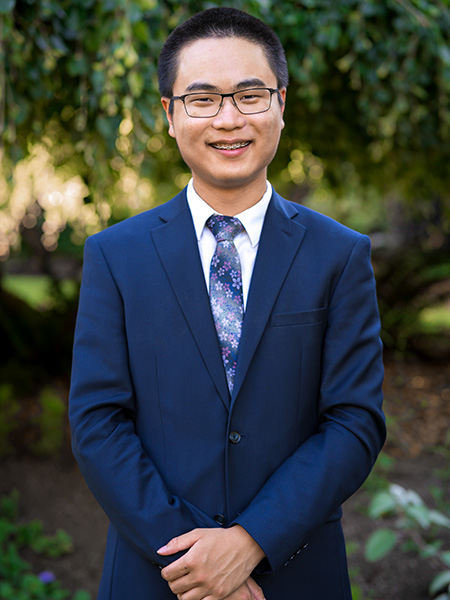Before his Entrepreneurship class earlier this year, Lawrence Tan saw starting a business as byzantine, an endeavor fraught with pitfalls for potential newcomers. But that changed after the Allen School sophomore and his team began building their idea for a smart note-taking platform, fine-tuning their pitch to investors and learning from those who have been there before.
“Going into the class, I viewed the process of starting a company as a nebulous, secretive practice reserved for well-connected businesspeople,” Tan said. “Hearing the instructors and the guests they invited speak about their personal startup experiences helped dispel this notion and showed me that there are many possible paths to entrepreneurship available for anyone who has an idea, regardless of what career path they come from.”
Taught by professor Ed Lazowska and Greg Gottesman, managing director for Pioneer Square Labs, along with professor emeritus Oren Etzioni, advisor and board member for the Allen Institute for AI (AI2) and a technical director of the AI2 Incubator, the entrepreneurship class has been a favorite of Allen School students for the past decade. Etzioni joined the class as an instructor this year.
“Everyone I talked to said that it was the best class they had ever taken at the UW,” Tan said. “After taking it myself I absolutely share this sentiment and I find myself recommending the class to every fellow CSE student I meet.”
Tan discovered it through word of mouth in the school’s undergraduate labs. The course requires students to form teams and develop a software startup idea, quickly putting them in the crucible and through their paces. Create, pitch, pivot and repeat.
For the course, 75 students are selected from the Allen School’s undergraduate and graduate programs, the Foster School of Business MBA program, the Master of Human-Computer Interaction and Design program (MHCI+D) and other design programs.
“It was an incredible opportunity to grow my confidence and leadership skills,” Tan said. “While I had worked on group projects in other CSE classes, leading a team of nine members across business, design and computer science disciplines required a completely different level of coordination and planning.”
With each iteration, teams receive feedback from instructors, special guests and fellow students. At the end, the goal is to persuade a potential investor to offer a second meeting.
When it came time to make the team’s final pitch, Tan stepped up and delivered the key points of the presentation that tied for the top performance in a class of eight amazing teams. It was the culmination of pushing the limits of his comfort zone, he said, a synthesis of learning how to pilot a project and keep it on track.
“Lawrence had the courage to demonstrate AutoNote ‘live’ to the assembled venture professionals by taking notes on another team’s presentation,” Lazowska said. “The demo was a triumph — to the extent that one of the VCs is talking with the team about pursuing the project as a startup. Lawrence is only a sophomore — he punches far, far, far above his weight!”
The course helped Tan see how to turn an abstract idea into a real business. Yet its ethos — create and collaborate — has been part and parcel of Tan’s experience from the start of his UW career.
In just two years at the Allen School, the Vancouver native has already made his mark. As a freshman, he joined Advanced Robotics at the University of Washington (ARUW), picking things up quickly from the club’s seniors. They helped him learn everything from high-level code architecture to the intricacies of processing camera, motion sensor and wheel odometry data, all of which are crucial to a robotics computer vision system.
They’ve also helped him grow as a leader. Worried about missing a week of classes during summer quarter, Tan had to be convinced to attend last year’s RoboMaster North America competition. They had their reasons — Tan led the design and implementation of a dual-camera system for the team’s robot fleet, which proved vital in attaining victory. At the competition last year, it was the only system of its kind.
“Going into the competition, there was an element of anticipation and surprise, as each team had hidden their most advanced and innovative new developments for the entire year in order to gain a competitive advantage,” Tan said. “It was interesting to hear about the different approaches each team took to design their robots and the software architectures that supported them, and it was incredibly rewarding to see our secret dual-turret sentry rapidly defeat an opposing robot during the final match of the competition.”
For the ARUW team, it was déjà vu. The team had defended its title from 2021.

“Through my experience at ARUW, I have learned how exciting it is to work on new and challenging projects,” he said. “The projects I am the most proud of are the ones where I had to put a lot of thought and research into a feature that our team had never attempted before.”
Tan has also been a teaching assistant for two computer science courses and has worked on research in the Social Futures Lab with Allen School professor Amy Zhang and Human Centered Design & Engineering Ph.D. student Kevin Feng. There, he is working on new AI-powered interfaces to help users better curate their social media feeds.
The research dovetails with his interest in human-computer interaction. Whether with people or computers, he sees working in concert — and remaining curious — as the solution to most challenges.
“Nowadays, I feel like the more I learn, the more areas I realize I don’t know anything about,” he said, laughing. “I hope that wherever I go, I continue to meet new people and uncover new things to learn.”


